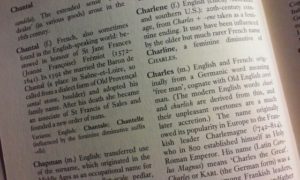A young child dreams of seven white geese marching down a street. All the people the geese walk past fall down dead. Surprisingly, C. G. Jung suggests that this is a favorable dream, that this is nature, via the dream, introducing the young child to the world of time. Everything passes. To the child’s world of timelessness, still bathed in the myths and depths of the collective unconscious, life and death are introduced, including her own awareness of herself as a mortal being in this world.

– Photo by Jan Ketchel
Life in this world is a bipolar affair. We all grapple with it. At one pole we feel our link to the timeless, as we often live as if we have forever! Though we may negatively judge this ‘slothful’ attitude, it nonetheless is a link to infinite life in timelessness, as an energy body or spirit. At the other pole is the truth of aging and mortality in a physical body, observed and experienced in fading life within and all around us.
At the beginning of every day the Shamans of Ancient Mexico say: “We are beings who are going to die.” This is their intent to keep their awareness fully present to their limited time and opportunity for life in this world. We are all beings saddled with the bipolar conundrum of life and death.
What Jung highlighted in this young child’s fall from innocence was the introduction of change, which happens when we enter life in time. Everything passes in time. Accepting this basic truth helps us to feel and release a wave of sadness. The pain of loss will eventually pass. In the world of time things mature and change and new possibilities for life will arise.
If we are gripped by a craving or passion, we know, if we hold on, that the compulsion will eventually pass. We may not be ready yet, we may still be too attached to the timeless pole of our being that accepts no limitations, but eventually we may be ready to inhabit our corporeal reality and accept the limitations of life in the body.
The great advantage of life in time, in a physical body, is that we are freed to complete our unique experience of life, what Jung called individuation. In time we unfold into the discovery and fulfillment of all that we are. We begin new things, be they careers, relationships, gardens, or books. We can nurture and live the course of these engagements to completion because in time, for better of worse, everything passes.
In time we can answer the questions of our ancestors and pose new ones for ourselves. To fully individuate in our life in time we must recapitulate. If we leave fragments of our lives unknown to ourselves we will not be able to integrate the full knowledge of our journey and we will leave behind questions that must be answered before completion. Perhaps this is the basis for reincarnation, bardo life, or time in purgatory.
My wife Jan lived in Sweden for several years during her twenties. She always felt she went there to fulfill something unfinished in a past life, to connect with and live out unfinished business with people who had once been very important to her. She was welcomed there with open arms, loved unconditionally, and she loved fully and unconditionally in return. She fully embraced being Swedish, learned the language quickly and fluidly, and did all things Swedish like a true Swede. When it was done, it was done. Time to move on and return to life in present time.

– Photo by Jan Ketchel
My first wife, Jeanne, also completed unfinished business, though she did it in spirit form, after her physical death, reconnecting with the birth mother she never knew in her life as Jeanne Ketchel. It was the completion of her lives on earth, her final chapter in space and time, described in the final chapter of The Book of Us, channeled through Jan.
For although everything does pass in time, that which is not fully realized must be completed somewhere, somehow before we are fully freed to move on in timelessness. As everything passes, as we complete our many paths of individuation, we enter infinity, enriched by our lives and ready to explore new paths of heart, in and out of time.
Finding the timeless in time,
Chuck



